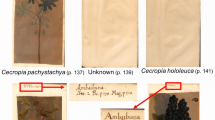Abstract
Pimenta dioica (Linn.) Merrill, known as allspice or pimento, is an important Jamaican crop and the island is the world's chief supplier. Unfortunately, improvement of the crop is hindered by a characteristic type of unfruitfulness among certain trees. The problem has long been recognized and was mentioned by P. Browne1 in 1755.
This is a preview of subscription content, access via your institution
Access options
Subscribe to this journal
Receive 51 print issues and online access
$199.00 per year
only $3.90 per issue
Buy this article
- Purchase on Springer Link
- Instant access to full article PDF
Prices may be subject to local taxes which are calculated during checkout
Similar content being viewed by others
References
Browne Patrick, The Civil and Natural History of Jamaica, 247 (1775).
Merrill, E. D., Contrib. Gray Herb., 165, 30 (1947).
Grisebach, A. M. R., Flora of the West Indian Islands, 240 (1864).
Ward, J. F., Pimento, Min. Agric. and Lands (Jamaica) Pub. (1961).
Darwin, C., The Forms of Flowers, Chap. 8, 281 (1877).
Author information
Authors and Affiliations
Rights and permissions
About this article
Cite this article
CHAPMAN, G., GLASGOW, S. Incipient Diœcy in Pimento. Nature 192, 1205–1206 (1961). https://doi.org/10.1038/1921205b0
Issue Date:
DOI: https://doi.org/10.1038/1921205b0
This article is cited by
-
Pollination and the yields of tropical crops: An appraisal
Euphytica (1964)
Comments
By submitting a comment you agree to abide by our Terms and Community Guidelines. If you find something abusive or that does not comply with our terms or guidelines please flag it as inappropriate.



